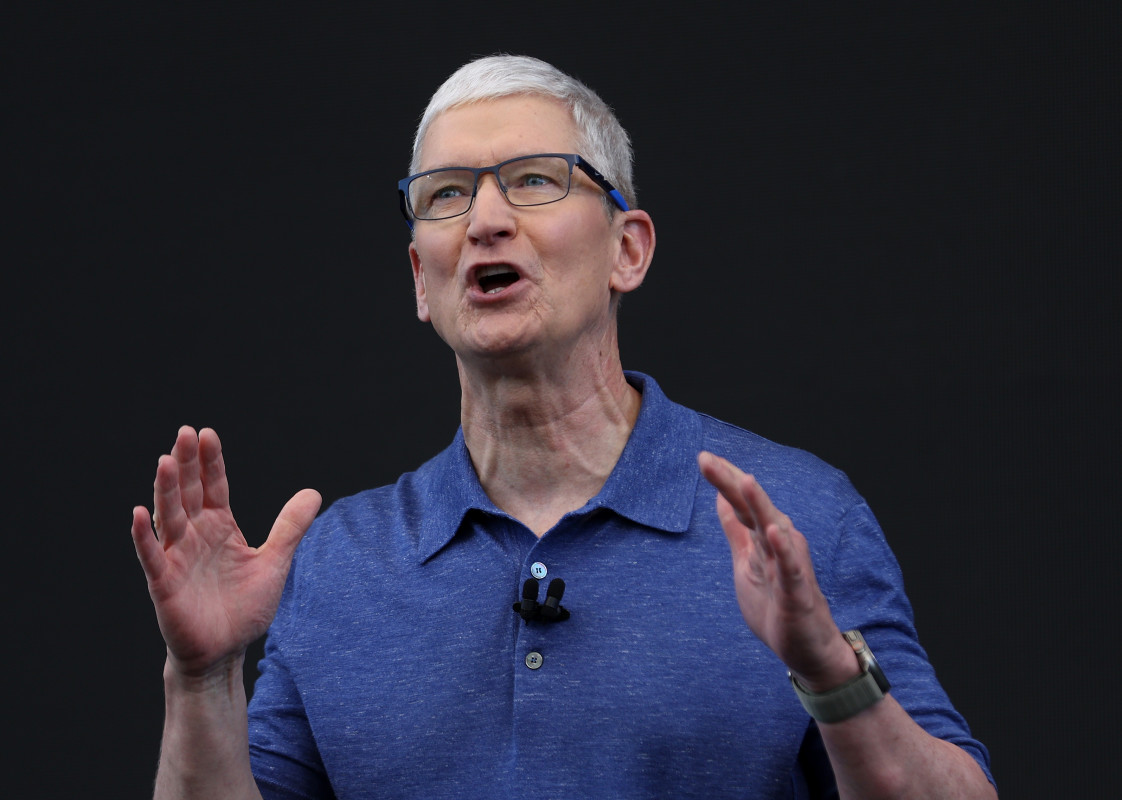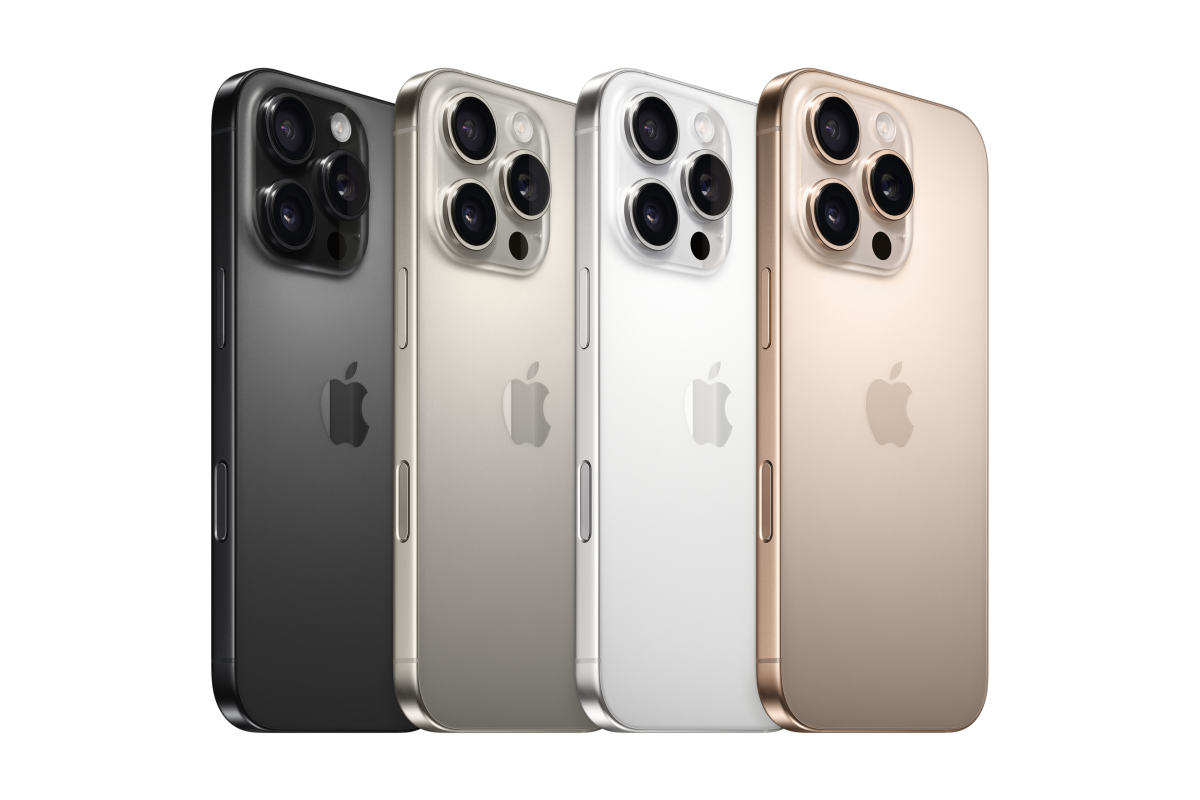
Yes, Jimmy Fallon, that really was Tim Cook.
The Tonight Show host recently was momentarily confused when he took a gander at Apple's (AAPL) CEO while wearing a Vision Pro headset and mistakenly thought he was looking a virtual rendition of the computer giant's top executive instead of the real McApple.
Don't miss the move: Subscribe to TheStreet's free daily newsletter
The two men were standing outside Apple's flagship store in New York where the new iPhone 16 was being sold.
"I try to come to Fifth Avenue because it's sort of the center of the world and the enthusiasm is so incredible there," Cook said during the video segment.
During a walk to the Upper East Side Apple Store, Fallon asked Cook what excited him about the new iPhone.
"I'm excited about all of it, to be honest," he said.
Maybe so, but that excitement doesn't seem to be catching on with consumers as much as earlier iPhone launches did.
Apple, which unveiled its latest iPhone model last month, is looking to use it as a launchpad for a host of artificial-intelligence initiatives, dubbed Apple Intelligence, that it plans to infuse across its 2.2-billion-user base.
The various AI-powered tools will be rolled out gradually over the coming months and only in certain markets, as Apple grapples with development challenges, regulatory pressures and increased competition in the global smartphone market.

Analyst cuts Apple iPhone forecasts
This appears to be hurting early iPhone 16 demand, with reports of shorter lead times, a measure of the time needed to make and fill a consumer order, when compared with previous handset launches.
Apple doesn’t give out preliminary sales figures, so analysts use a number of measures to estimate how sales are going.
Related: Analysts question iPhone 16 demand pace as Apple stock extends slide
According to TF International Securities, Apple sold 37 million iPhone 16s in the first weekend of presales, down 12% from the iPhone 15 debut in 2023.
The iPhone is Apple's biggest selling product and investment firms have been responding to the company's current challenges.
On Oct. 1 Citi analyst Atif Malik cut the investment firm's iPhone-unit forecasts in the September and December quarters by 2 million each and now expects iPhone 16 units to be 83 million this year, according to The Fly.
Malik also increased his March and June 2025 quarter iPhone unit estimates up by 4 million and 7 million, respectively. Citi now expects 2024 and 2025 iPhone units to be 224 million and 246 million, respectively, or down 3% and 9% on a year-over-year basis.
With Apple Intelligence to be released in the U.S. later in October and a major update of the Siri digital assistant likely next year, the iPhone refresh will happen in 2025 with the iPhone 17 launch, Malik said.
He also says the overall shorter lead times for iPhone 16 series reflect better supply. More important, consumers are likely waiting to see how Apple Intelligence will affect their daily interaction with their phones before upgrading.
Malik affirmed a buy rating on Apple with a $255 price target.
Barclays: Apple cuts orders from supplier
Barclays said the firm's channel checks indicate that iPhone 16 orders have been cut for the December quarter at a key Taiwanese supplier.
The firm previously discussed shorter lead times across iPhone 16 models globally, both of which indicate softer demand for iPhone 16.
Barclays said that Apple may have cut roughly 3 million units at a key semiconductor component supplier in iPhones for the December quarter. If that cut is confirmed, it would be the earliest build cut in recent history, the firm said.
Related: A decision by Nvidia's CEO Jensen Huang raises eyebrows
Barclays' sell-through checks point to 15% declines year-over-year for global iPhone 16 sales in the first week of sales.
It also tracked iPhone availability across geographies globally, which suggest softer demand for the 16 relative to last year. The firm maintained an underweight rating on Apple with a $186 price target.
On Oct. 2, JP Morgan analyst Samik Chatterjee said the iPhone 16 has been available to consumers for a little over a week and the launch is "lacking early momentum" for the high-end models when compared with prior cycles, according to The Fly.
The difference in the lead times relative to prior years in the early weeks points to "more muted momentum" in early orders for the Pro models relative to JP Morgan's original expectations, the analyst said.
Investment firm expects 'robust AI cycle'
Chatterjee said this is likely due to the unavailability of artificial intelligence capabilities, with consumers likely delaying purchases until the features are available and the value proposition is better understood.
As a result, JP Morgan moderated its near-term iPhone-unit forecast and now expects total iPhone volumes to track to 126 million in the second half of 2024 versus 130 million prior and 132 million a year earlier.
More Tech Stocks:
- Analysts revise Corning stock price targets after investor meeting
- Analyst revamps Salesforce stock price target after conference
- Analysts praise groundbreaking Tesla rival, preview robotaxi event
That said, the firm's expectations for a "robust AI cycle" in the medium-term remain unchanged, as it notes the revision in near-term estimates represents only a modest push out from volumes to later in the cycle.
Chatterjee said that he expected consumer appetite for the AI-based iPhones, including the 16 Series, to increase with the broader availability of AI features. The firm kept an overweight rating on Apple with a $265 price target.
In August Apple posted a stronger-than-expected fiscal third quarter, but iPhone revenue was at its lowest mark since the quarter ended September 2021, and it declined 1% from a year earlier.
Apple is scheduled to report fiscal-fourth-quarter earnings on Oct. 31, with early estimates suggesting earnings of around $1.60 a share on revenue of $94.4 billion.
Apple plans new low-end iPhone model
Meanwhile, Apple is close to starting production of an updated iPhone SE that will serve as a new low-end model and is also aiming to manufacture new iPad Air models, Bloomberg reported, citing people familiar with the matter.
The company is nearing production of an updated iPhone SE — codenamed V59 — that will become its new entry-level model.
Apple is also aiming to manufacture new iPad Air models and keyboards for release around the same time.
The release will mark the first update to the iPhone SE since 2022, when Apple added 5G capability to the device. With the latest model, Apple will move away from the old home button design and transition to an edge-to-edge screen.
Related: Veteran analyst who predicted Rocket Lab stock surge updates outlook
The company is also contending with extensive damage from a fire at Tata Group's Apple iPhone component plant in southern India. This could hamper production ahead of a festive season sales surge, Reuters reported on Oct. 1, forcing the U.S. firm's suppliers to arrange critical parts from China or elsewhere.
The blaze caused an indefinite production halt at Tata's Hosur plant in Tamil Nadu, the only Indian supplier of iPhone back panels and some other parts for both contract manufacturer Foxconn in the country and its own iPhone assembly at another plant.
Hong Kong-based Counterpoint Research estimated local sales of 1.5 million units of iPhone 14 and 15 models during the Indian festive season, which runs from late October to early November, with Apple struggling to fulfill as much as 15% of that demand due to the fire.
Related: The 10 best investing books, according to our stock market pros







